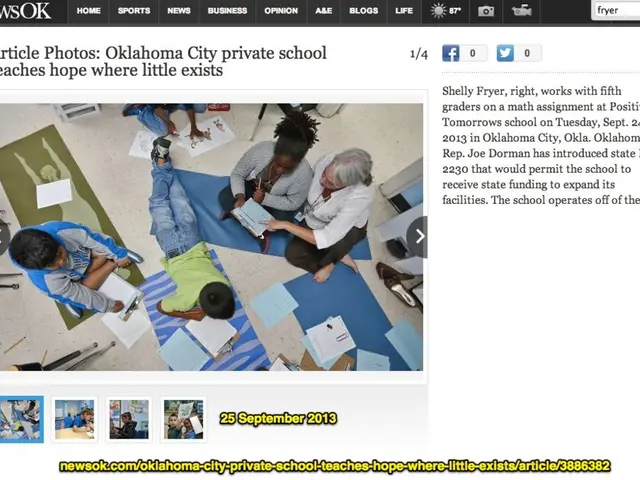Federal government contemplating revoking research funds for institutions enforcing Diversity, Equality, and Inclusion initiatives and participating in Israeli boycotts.
The National Institutes of Health (NIH) is set to strip funding from universities with diversity and inclusion programs, as well as any institutions participating in boycotts of Israeli companies, a policy change announced Monday.
The agency reserves the right to cancel financial aid and reclaim funds if grant recipients fail to comply with federal guidelines banning diversity and equity research, along with "prohibited boycotts," the notice stated. This policy applies to new, renewal, supplement, or continuation awards issued from April 21 onwards.
This policy mirrors funding freezes implemented by the Trump administration on Harvard and Columbia universities over diversity efforts and responses to antisemitism on campus. The latest policy shift could have widespread implications for research universities across the United States.
In response, Harvard University filed a lawsuit against the administration on Monday. In a letter to the Harvard community, President Alan M. Garber stated that the administration's recent actions against the prestigious institution have severe real-life consequences for students, faculty, staff, researchers, and the standing of American higher education in the world.
The NIH is the world's largest public funder of biomedical research, issuing approximately 60,000 grants per year to nearly 3,000 universities and hospitals. More than 80% of the agency's $48 billion annual budget goes towards these research grants. Harvard University received $488 million in NIH funding in fiscal year 2024, accounting for the majority of its total $686 million in federal research funding.
The change in grant requirements provides new leverage for the Trump administration's efforts to crack down on diversity initiatives. Last month, officials canceled a range of grants focusing on diversity, health disparities, and marginalized groups. While these cancellations were met with legal challenges, the ongoing policy shift could cause financial strain at universities relying on federally funded research.
The White House's crackdown on higher education could lead to financial difficulties at colleges and universities, according to S&P Global Ratings. "Material cuts to federal research funds could create operating pressures," S&P stated in a report. If federal funding is reduced, university management may consider budget options such as layoffs, spending cuts, and reduced research programs. Proposed caps on indirect cost recovery rates for research grants would further squeeze institutions financially, adding to their financial woes.
The Association of American Medical Colleges, a nonprofit organization that serves medical schools and teaching hospitals in the U.S., acknowledged the recently added terms and conditions for HHS and NIH grants. "The partnership between NIH and academic institutions is the cornerstone of our nation's scientific progress," the group stated. "We remain fully committed to improving the health of all Americans, a goal that requires robust federal funding for research."
In a broader context, the NIH's policy shift and funding withdrawals targeting universities with diversity initiatives and Israel boycotts have far-reaching implications for academia, research, and public health:
- Research Disruptions and Institutional Pressures: The freezing of NIH grants immediately disrupts ongoing studies, particularly in biomedical and public health fields. Projects depending on federal funding face abrupt halts, potentially derailing years of work and causing career instability for researchers. Institutions may face compliance demands such as restructuring academic programs or governance to restore funding.
- Impact on Diversity and Academic Freedom: Targeting diversity programs risks reversing decades of progress in broadening participation in STEM fields. Proposed NIH cuts to initiatives like the Fogarty International Center—which supports global health training—threaten capacity-building in underrepresented regions. Universities also face pressure to align hiring practices and curricula with political directives, potentially compromising academic independence.
- Public Health Consequences: Cuts to agencies like the CDC’s infectious disease programs and NIH preparedness offices could weaken responses to future pandemics and slow the development of treatments. Long-term effects could include brain drain as researchers seek stable funding abroad and reduced U.S. competitiveness in science.
- Political and Institutional Dynamics: The Trump administration’s use of funding as leverage, citing antisemitism concerns while targeting diversity programs, creates a precedent for political interference in research priorities. This risks chilling certain areas of inquiry, particularly those tied to social justice or international collaborations.
- The NIH's policy change, which stipulates the withdrawal of funding for universities with diversity and inclusion programs or participating in Israeli boycotts, may lead to abrupt disruptions in ongoing biomedical and public health studies.
- Universities, in an effort to restore funding, may need to restructure academic programs or governance to comply with the NIH's directive, risking potential derailment of years of research and career instability for researchers.
- This policy shift, targeting diversity programs, could reversal decades of progress in broadening participation in STEM fields and threaten capacity-building in underrepresented regions, such as through the Fogarty International Center.
- Institutions may face pressure to align their hiring practices and curricula with political directives, potentially compromising academic independence and artistic freedom.
- In the broader context of academia, research, and public health, the NIH's policy aims at universities with diversity initiatives and Israel boycotts could have far-reaching implications, including weakening responses to future pandemics and slowing the development of treatments.
- The ongoing policy shift and funding freezes, initiated by the Trump administration, could lead to financial difficulties at colleges and universities, potentially causing operating pressures that may result in layoffs, spending cuts, and reduced research programs. This could also impact the general news sector, as universities rely on federally funded research for finance and business endeavors, as well as education and self-development, policy and legislation, and politics.








